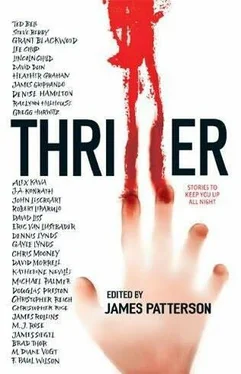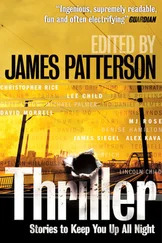"I'm suntanned, Paul," Greta said. "There should be a pale ring mark on my finger. The clerk knows I haven't worn the ring more than a few days."
"You have a dark complexion."
"Not that dark. Look under my wristwatch. My sunglasses have left a pale patch on my nose. He saw all that, too, Paul."
Hareet looked at his watch. "We'll wait half an hour for the contact."
The knock came in fifteen minutes.
Hareet opened the door. Behind him, the shower was running in the bathroom, the noise coming from under the bathroom door.
The two dark-eyed men who came into the suite wore Western clothes. They both glanced toward the sound of the shower, then back at Hareet.
"My wife can't stand this heat of yours, too muggy," Hareet said with an apologetic smile. "Back home, our heat isn't so humid. Dry and not all that hot except when the Santa Anas blow down the canyons, you know?"
"In Santa Barbara, sir?" one man said. "The sundowner winds, yes?"
The other man walked through the rooms, his hand in his pocket. All the rooms except the bathroom. He returned, shook his head to the first man, and stood near the hall door they had left open.
"That's right," Hareet said to the first man. "You've been to Santa Barbara?"
"If you will ask your wife-" the first man began.
Greta appeared silently in the open door from the hall. The man at the door heard her soft step, turned. She stabbed him twice in the heart before he could move or even open his mouth.
Hareet's knife appeared in his hand. The first man only managed to half draw his pistol. Hareet killed him with a single thrust.
Greta closed the door. They dragged the bodies into the bedroom and pushed them into a closet, moved the furniture just enough to cover the bloodstains on the carpeting. They changed into Arab clothes and left the room. They took nothing with them but their weapons and their second set of papers. They took the back stairs down.
Before they left, Hareet broke the mirror of the dressing table in the bedroom.
In the noisy streets, they mingled with the crowd. As they walked through the packed throngs of the enemy capital, Greta held Hareet's hand once. Her veil hid her face. Then they separated and she walked behind him until they reached the dark and deserted streets in the slums of the city where the fellahin wallowed in filth and misery.
On a particularly dark and silent street they went down four steps into a dank cellar where water ran in a deep trough at one side of the room. Slime floated on the water and rats swam in the slime. Hareet haggled with a one-eyed Arab in ragged Western clothes and a stained fez. Money changed hands. Hareet and Greta found a deserted corner of the cellar. They lay down to sleep as much as they could.
"How long do we have?" Greta said.
"As long as we've always had, Greta. Two more days."
They spoke softly in stilted Arabic. Water spouted in ragged streams from pipes in the walls, human waste reeked through the darkness. The people lay in stuporous sleep, or sat against the walls and stared at the poverty and need and squalor of their lives. No one cared about Greta and Hareet in the darkness and silence of the cellar, no one was suspicious. Patriotism does not run deep among the ragged and starving and diseased of any country, not even here where patriotism was often all they had to make them feel human.
"They have no way to trace us," Hareet said. "The Rogerses are gone for good. They know that two spies are in the city, but they expected there would be spies anyway. Our problem is still the same-to get the data. The only change is that it will be a little harder to get it back and in time."
"There's another change, Paul," Greta said. "We don't have a bed for tonight."
"No," Hareet said. "I'm sorry, liebchen"
Greta smiled at the endearment that was far from his stilted Arabic. "I'm sorrier," she said, and lay close against him in the dimness. "Where will we live when we retire, when this is over?"
Hareet stroked her arm softly. "There's a hill in the north. It looks out over orange trees and an olive grove. You can see the border. I own it, and when I can look at that border and know that no danger will ever come across it again, then we will build a stone house and live in it."
They slept for a time, took turns on watch. Greta was awake when the ragged peddler sidled up to them like an apparition from the slimy water of the cellar itself. She touched Hareet, who opened his eyes but did not move.
"The mirror could be mended," the peddler whispered in English.
Hareet took his hand from the pistol under his ragged robes. Greta slipped her knife back up her voluminous sleeve. "We had to kill two," Hareet said.
"They were found. Fortunately, I had seen the mirror five minutes before. What is your assignment?"
"The ammunition dumps, supply depots, fuel centers."
"Impossible. The maps and information are in General Staff Headquarters," the peddler said.
"I can get in," Hareet said.
"But not out, Captain. No way you can get out. Not with the data in usable form."
"Why?" Greta asked.
The filthy peddler sat against the wet stone walls, seemed to close his eyes and go to sleep. "Because our Arab friends have become modern, Lieutenant. At least at General Staff Headquarters. The documents will have been chemically treated so that no one can touch them undetected, or film them undetected. A sophisticated touch supplied by their friends in the bigger nations. Also, to get out you must pass two ranks of guards and locked gates, and a bank of detectors that detect film or the documents themselves."
"So if we steal them, they would know at once and change the locations."
"If you got them out, the present locations would be changed as fast as they could do it. Perhaps a short delay in their plans, and no help to us."
"And we could only make the attempt once," Greta said.
"No matter how many attempts we made, the data is useful to us only as long as they do not know we have it," Hareet said. "It must be taken and sent to our forces undetected."
"And that can't be done, Captain," the peddler said. "We'll have to beat them head to head, no matter how bad that looks."
"Everything can be done in some way," Hareet said, and sat for a time in the raw stench of the cellar filled only with the sound of running and dripping water. "Our man inside General Staff Headquarters is still there at his job?"
"Yes." The peddler nodded. "But there is no way-"
"The main building with the information we need is inside a courtyard?"
"Yes. And there is a locked gate in the outer wall of the courtyard."
"Where are the detectors?" "At the door of the building."
"How is the security inside the building in the day and the night?"
"In the day, fairly tight. At night, poor. They rely on the wall and outer gates and perimeter guards. The guards inside make rounds but don't go into the offices. The staff officers don't trust the soldiers with keys to the offices. That's their weakness."
"And we'll use it," Hareet said.
"Can we go in together, Paul?" Greta said.
"Of course not," Hareet said simply. Then he smiled at her.
"But perhaps we can find some private place later tonight. A place for us to sleep."
She smiled in return. "Tonight, then."
Hareet and the peddler lay down on the stone. Greta sat up, watching. Hareet and the peddler talked for a long time. It was well past midnight when the peddler left alone. Hareet and Greta pretended to sleep for another hour, then slipped out of the dank cellar together.
"Our peddler gave me another address," Hareet said. "Somewhere we can be alone. It's not far."
They both knew the danger of such a move, every moment on the streets brought the possibility of being stopped, observed, making a mistake. Every new place exposed them to more contacts, more unexpected events. But they both also knew the risks of tomorrow.
Читать дальше












